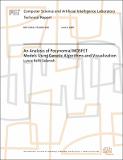An Analysis of Posynomial MOSFET Models Using Genetic Algorithms and Visualization
Author(s)
Salameh, Lynne Rafik
DownloadMIT-CSAIL-TR-2007-032.ps (17.49Mb)
Additional downloads
Other Contributors
Humanoid Robotics
Advisor
Una-May O'Reilly
Metadata
Show full item recordAbstract
Analog designers are interested in optimization tools which automate the process of circuit sizing. Geometric programming, which uses posynomial models of MOSFET parameters, represents one such tool. Genetic algorithms have been used to evolve posynomial models for geometric programs, with a reasonable mean error when modeling MOSFET parameters. By visualizing MOSFET data using two dimensional plots, this thesis investigates the behavior of various MOSFET small and large signal parameters and consequently proposes a lower bound on the maximum error, which a posynomial cannot improve upon. It then investigates various error metrics which can be used to balance the mean and maximum errors generated by posynomial MOSFET models. Finally, the thesis uses empirical data to verify the existence of the lower bound, and compares the maximum error from various parameters modeled by the genetic algorithm and by monomial fitting. It concludes that posynomial MOSFET models suffer from inherent inaccuracies. Additionally, although genetic algorithms improve on the maximum model error, the improvement, in general, does not vastly surpass results obtained through monomial fitting, which is a less computationally intensive method. Genetic algorithms are hence best used when modeling partially convex MOSFET parameters, such as r0 .
Description
MEng thesis
Date issued
2007-06-05Other identifiers
MIT-CSAIL-TR-2007-032
Series/Report no.
Massachusetts Institute of Technology Computer Science and Artificial Intelligence Laboratory
Keywords
limiations, convex optimization